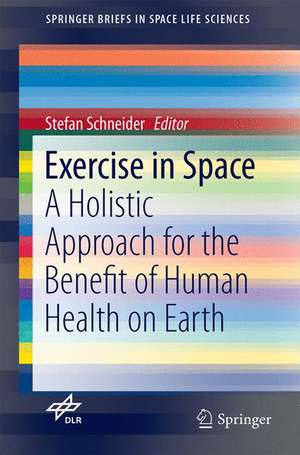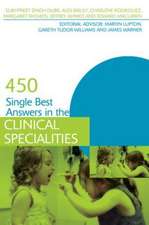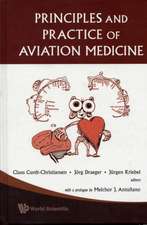Exercise in Space: A Holistic Approach for the Benefit of Human Health on Earth: SpringerBriefs in Space Life Sciences
Editat de Stefan Schneideren Limba Engleză Paperback – 23 mai 2016
The book is written for scientists in biomedicine, more specific in aging research, sports physiology and neurosciences.
Preț: 359.60 lei
Preț vechi: 378.54 lei
-5% Nou
Puncte Express: 539
Preț estimativ în valută:
68.83€ • 74.79$ • 57.86£
68.83€ • 74.79$ • 57.86£
Carte tipărită la comandă
Livrare economică 21 aprilie-05 mai
Preluare comenzi: 021 569.72.76
Specificații
ISBN-13: 9783319295695
ISBN-10: 3319295691
Pagini: 134
Ilustrații: XVII, 108 p. 19 illus., 11 illus. in color.
Dimensiuni: 155 x 235 x 7 mm
Greutate: 0.19 kg
Ediția:1st ed. 2016
Editura: Springer International Publishing
Colecția Springer
Seria SpringerBriefs in Space Life Sciences
Locul publicării:Cham, Switzerland
ISBN-10: 3319295691
Pagini: 134
Ilustrații: XVII, 108 p. 19 illus., 11 illus. in color.
Dimensiuni: 155 x 235 x 7 mm
Greutate: 0.19 kg
Ediția:1st ed. 2016
Editura: Springer International Publishing
Colecția Springer
Seria SpringerBriefs in Space Life Sciences
Locul publicării:Cham, Switzerland
Cuprins
Motor skills.- Adaptation of cartilage to immobilization.- Influence of Weightlessness on Aerobic Capacity, Cardiac Output and Oxygen Uptake Kinetics.- Enhancing mental health: Effects of exercise on social well-being and social ill-being.- Neurocognitive and neuro-affective effects of exercise.
Notă biografică
Prof. Stefan Schneider is Director of the “Zentrum für Integrative Physiology im Weltraum (ZiP)” – Center for Health and Integrative Physiology in Space. Cologne, Germany.
Dr. Vera Abeln is scientist and lecturer at the German Sport University Cologne at the Institute of Movement and Neurosciences with special interest in the effect of training interventions and active lifestyle on brain health.
Prof. Otmar Leo Bock is head of the Institute of Physiology and Anatomy at the German Sport University, Cologne, Germany.
Dr. Uwe Drescher is research associate at German Sport University Cologne, Institute of Physiology and Anatomy, Germany. He is involved in several projects dealing with exercise physiology with focus on cardio dynamic and pulmonary regulations as well as mathematical-physiological modelling. Dr. Drescher is member of the “Zentrum für Integrative Physiology im Weltraum (ZiP)” – Center for Health and Integrative Physiology in Space. Cologne, Germany.
Dr. sportwiss. Uwe Hoffmann is senior researcher at German Sport University Cologne, Institute of Physiology and Anatomy, Germany. Since 1985 he is involved in Space physiology and assigned primary and co-investigator in several projects focused on exercise and training in Space and other extreme environments. His expertise are spiroergometric methods to evaluate metabolic, respiratory and cardiovascular control. Dr. Hoffmann is member of the “Zentrum für Integrative Physiology im Weltraum (ZiP)” – Center for Health and Integrative Physiology in Space. Cologne, Germany
Prof. Jens Kleinert is Head of the Institute of Psychology and Vice President for Learning and Teaching at the German Sport University Cologne. Central issues of his lab group are stress, emotion, motivation, and group processes in relation to exercise and sport.
Mrs. Jessica Koschate is research associate at the Institute of Physiology and Anatomy of the German Sport University in Cologne. Her research interests are related to the influences of changes in gravity, age and health status on cardiorespiratory regulations. Mrs. Koschate is member of the “Zentrum für Integrative Physiology im Weltraum (ZiP)” – Center for Health and Integrative Physiology in Space. Cologne, Germany
Dr. Anna-Maria Liphardt is a research scientist at the Department of Internal Medicine 3 - Rheumatology and Immunology - of the Friedrich-Alexander-Universität Erlangen-Nürnberg (FAU), and at the Institute of Biomechanics and Orthopaedics at the German Sport University Cologne. Dr. Liphardt is studying the influence of immobilization, microgravity and physical activity on cartilage and bone health in healthy subjects and patient cohorts.
PD Dr. Anja Niehoff is Senior Lecturer at the Institute of Biomechanics and Orthopaedics, German Sport University Cologne, Germany and Head of the Cologne Center for Musculoskeletal Biomechanics atthe Medical Faculty, University of Cologne, Germany.
Dr. Fabian Pels is a research assistant at the Institute of Psychology at the German Sport University Cologne. His research focus is on group processes in relation to exercise and sport.
Assist. Prof. Tobias Vogt is Head of Institute in the Institute of Professional Sport Education and Sport Qualifications at the German Sport University. Cologne, Germany.
Dr. Vera Abeln is scientist and lecturer at the German Sport University Cologne at the Institute of Movement and Neurosciences with special interest in the effect of training interventions and active lifestyle on brain health.
Prof. Otmar Leo Bock is head of the Institute of Physiology and Anatomy at the German Sport University, Cologne, Germany.
Dr. Uwe Drescher is research associate at German Sport University Cologne, Institute of Physiology and Anatomy, Germany. He is involved in several projects dealing with exercise physiology with focus on cardio dynamic and pulmonary regulations as well as mathematical-physiological modelling. Dr. Drescher is member of the “Zentrum für Integrative Physiology im Weltraum (ZiP)” – Center for Health and Integrative Physiology in Space. Cologne, Germany.
Dr. sportwiss. Uwe Hoffmann is senior researcher at German Sport University Cologne, Institute of Physiology and Anatomy, Germany. Since 1985 he is involved in Space physiology and assigned primary and co-investigator in several projects focused on exercise and training in Space and other extreme environments. His expertise are spiroergometric methods to evaluate metabolic, respiratory and cardiovascular control. Dr. Hoffmann is member of the “Zentrum für Integrative Physiology im Weltraum (ZiP)” – Center for Health and Integrative Physiology in Space. Cologne, Germany
Prof. Jens Kleinert is Head of the Institute of Psychology and Vice President for Learning and Teaching at the German Sport University Cologne. Central issues of his lab group are stress, emotion, motivation, and group processes in relation to exercise and sport.
Mrs. Jessica Koschate is research associate at the Institute of Physiology and Anatomy of the German Sport University in Cologne. Her research interests are related to the influences of changes in gravity, age and health status on cardiorespiratory regulations. Mrs. Koschate is member of the “Zentrum für Integrative Physiology im Weltraum (ZiP)” – Center for Health and Integrative Physiology in Space. Cologne, Germany
Dr. Anna-Maria Liphardt is a research scientist at the Department of Internal Medicine 3 - Rheumatology and Immunology - of the Friedrich-Alexander-Universität Erlangen-Nürnberg (FAU), and at the Institute of Biomechanics and Orthopaedics at the German Sport University Cologne. Dr. Liphardt is studying the influence of immobilization, microgravity and physical activity on cartilage and bone health in healthy subjects and patient cohorts.
PD Dr. Anja Niehoff is Senior Lecturer at the Institute of Biomechanics and Orthopaedics, German Sport University Cologne, Germany and Head of the Cologne Center for Musculoskeletal Biomechanics atthe Medical Faculty, University of Cologne, Germany.
Dr. Fabian Pels is a research assistant at the Institute of Psychology at the German Sport University Cologne. His research focus is on group processes in relation to exercise and sport.
Assist. Prof. Tobias Vogt is Head of Institute in the Institute of Professional Sport Education and Sport Qualifications at the German Sport University. Cologne, Germany.
Caracteristici
Discusses how to enhance Mental Health Highlights the effects of physiological exercise on the aging brain Summarizes the newest findings from Space research Includes supplementary material: sn.pub/extras

















